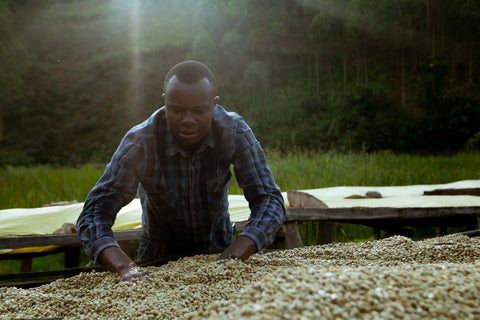Join us for a conversation with team Sucafina Specialty, a proud partner of Standart Issue 28.
Sucafina released its 2021 sustainability report in September. What would you say were the biggest highlights from the report?
In our 2021 report, we were proud to share our progress and highlights from across the three key action pillars of our 2030 sustainability strategy, including:
Investing in Farmers: Farmers are at the heart of our business and we delivered projects that are having a real impact on the lives and livelihoods of around 200,000 farmers. We trained and certified more than 125,000 farmers, surpassing 100,000 certified farmers in East Africa and certifying farmers in Papua New Guinea for the first time.
Caring for People: Protecting and promoting human rights is a major challenge for our industry and we commissioned a full external review of our policies and strengthened our frameworks. With the Kahawatu Foundation and other partners, we co-funded numerous projects to train and support farming communities in countries where we operate.
Protecting Our Planet: Five of our origins (Brazil, Colombia, Kenya, Rwanda, and Uganda) completed their carbon footprint mapping and can now assess their carbon emissions from farm to FOB. 69% of our direct supply chain is being assessed for deforestation, involving over 47,000 farmers in nine origins.
You have recently launched your IMPACT programme. Could you briefly describe what it is?
IMPACT is Sucafina’s responsible sourcing program that benefits farmers, traders, and roasters to create a fairer, more resilient coffee industry.
At the heart of IMPACT is a sustainability standard that, like other standards, assures that practices along Sucafina’s supply chain are ethical and sustainable. IMPACT also goes beyond compliance by promoting measurable, positive change in five key areas of sustainability, such as improving living income and reducing deforestation.
IMPACT will become one of the most important tools in achieving Sucafina's purpose of sustainably reshaping our industry to create stakeholder value..
A large part of the programme is the IMPACT Sustainability Standard. Can you tell us what criteria organisations have to satisfy to be classified as sustainably sourced under this rubric? How can farmers and other facilities join the IMPACT programme?
The IMPACT Sustainability Standard is made up of 80 social, environmental, and economic practices, modelled on the Global Coffee Platform’s Sustainability Reference Code. To be classified as sustainably sourced, farmers and facilities must comply with all 10 mandatory Critical Indicators, which are designed to eliminate human rights abuses. They must also meet at least 50% of the 70 Improvement Indicators in their first audit and continuously improve from there.
Our vision is to eventually make IMPACT open source in the sense that all stakeholders can adopt the program and contribute to improving it over time. For now, we will be deploying IMPACT in as many direct supply chains as possible (we work with over 200,000 farmers worldwide), as well as opening it up to selected third parties.
This interview was published in partnership with Sucafina.



